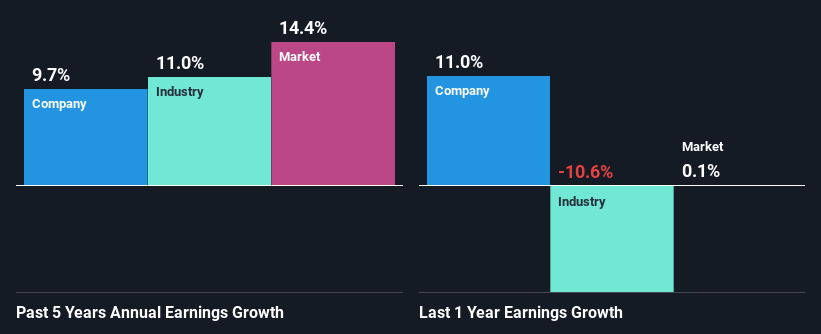Declining Stock and Solid Fundamentals: Is The Market Wrong About Paychex, Inc. (NASDAQ:PAYX)?
It is hard to get excited after looking at Paychex's (NASDAQ:PAYX) recent performance, when its stock has declined 2.0% over the past three months. However, a closer look at its sound financials might cause you to think again. Given that fundamentals usually drive long-term market outcomes, the company is worth looking at. Particularly, we will be paying attention to Paychex's ROE today.
Return on equity or ROE is an important factor to be considered by a shareholder because it tells them how effectively their capital is being reinvested. Simply put, it is used to assess the profitability of a company in relation to its equity capital.
See our latest analysis for Paychex
How Do You Calculate Return On Equity?
The formula for ROE is:
Return on Equity = Net Profit (from continuing operations) ÷ Shareholders' Equity
So, based on the above formula, the ROE for Paychex is:
45% = US$1.6b ÷ US$3.6b (Based on the trailing twelve months to August 2023).
The 'return' refers to a company's earnings over the last year. That means that for every $1 worth of shareholders' equity, the company generated $0.45 in profit.
Why Is ROE Important For Earnings Growth?
Thus far, we have learned that ROE measures how efficiently a company is generating its profits. Based on how much of its profits the company chooses to reinvest or "retain", we are then able to evaluate a company's future ability to generate profits. Assuming all else is equal, companies that have both a higher return on equity and higher profit retention are usually the ones that have a higher growth rate when compared to companies that don't have the same features.
A Side By Side comparison of Paychex's Earnings Growth And 45% ROE
To begin with, Paychex has a pretty high ROE which is interesting. Secondly, even when compared to the industry average of 12% the company's ROE is quite impressive. This likely paved the way for the modest 9.7% net income growth seen by Paychex over the past five years.
As a next step, we compared Paychex's net income growth with the industry and found that the company has a similar growth figure when compared with the industry average growth rate of 11% in the same period.
Earnings growth is a huge factor in stock valuation. The investor should try to establish if the expected growth or decline in earnings, whichever the case may be, is priced in. Doing so will help them establish if the stock's future looks promising or ominous. Has the market priced in the future outlook for PAYX? You can find out in our latest intrinsic value infographic research report.
Is Paychex Efficiently Re-investing Its Profits?
The high three-year median payout ratio of 76% (or a retention ratio of 24%) for Paychex suggests that the company's growth wasn't really hampered despite it returning most of its income to its shareholders.
Moreover, Paychex is determined to keep sharing its profits with shareholders which we infer from its long history of paying a dividend for at least ten years. Based on the latest analysts' estimates, we found that the company's future payout ratio over the next three years is expected to hold steady at 75%. Therefore, the company's future ROE is also not expected to change by much with analysts predicting an ROE of 45%.
Conclusion
Overall, we are quite pleased with Paychex's performance. Especially the high ROE, Which has contributed to the impressive growth seen in earnings. Despite the company reinvesting only a small portion of its profits, it still has managed to grow its earnings so that is appreciable. That being so, a study of the latest analyst forecasts show that the company is expected to see a slowdown in its future earnings growth. Are these analysts expectations based on the broad expectations for the industry, or on the company's fundamentals? Click here to be taken to our analyst's forecasts page for the company.
Have feedback on this article? Concerned about the content? Get in touch with us directly. Alternatively, email editorial-team (at) simplywallst.com.
This article by Simply Wall St is general in nature. We provide commentary based on historical data and analyst forecasts only using an unbiased methodology and our articles are not intended to be financial advice. It does not constitute a recommendation to buy or sell any stock, and does not take account of your objectives, or your financial situation. We aim to bring you long-term focused analysis driven by fundamental data. Note that our analysis may not factor in the latest price-sensitive company announcements or qualitative material. Simply Wall St has no position in any stocks mentioned.

 Yahoo Finance
Yahoo Finance 
